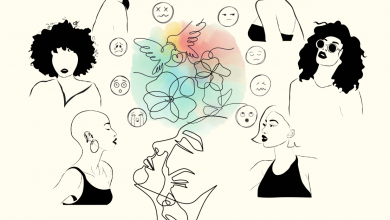Girl-on-Girl Crime: How “Supporting All Women” Can Be Problematic

Illustration by Mrinaalika Sivakumar
On Saturday, February 6th, the first female Secretary of State, Madeleine Albright, went to bat for presidential candidate Hillary Clinton in New Hampshire. She told the rally in Concord: “Just remember, there’s a special place in hell for women who don’t help each other.”
Within the feminist movement, the idea of supporting all women seems, at face value, like a great idea. Women have it hard enough; as a systematically oppressed group, we don’t receive much support. Thereby, this sense of sisterhood becomes a great tool in fighting oppression from social, political and economic institutions dominated by men. If this patriarchal society won’t help and support us, then we will help and support each other.
It’s a nice thought, but it’s also deeply problematic.
This shame-tactic repeatedly used by Albright (so often, that it appeared on a Starbucks cup) doesn’t leave room for the intersections of feminism. It doesn’t take into account the varying causes, opinions, and lifestyles of the feminist movement. It doesn’t leave agency with the woman on the statement’s receiving end.
Instead, it’s used as a weapon; the idea is that if you, a woman, do not agree with another woman, you are the problem. You are being a bad feminist. You are not doing your duty as an oppressed woman to (blindly) support and follow all other oppressed women to help the larger cause.
The irony is that Albright’s famous statement places another heavy burden on the already oppressed whilst seemingly being entirely pro-woman. The woman on the receiving end of comment is no longer in power of her identity, her decision, or her emotions. When Albright called on young women to vote for Clinton with her sentiment, she implied that any woman supporting senator Bernie Sanders was destined for hell, or at least metaphorical “Feminist Hell.” She implied that one could not identify as a feminist if they did not align themselves with Clinton. She placed a box around women, limiting them entirely. Albright later defended her statement in a tweet, but still, her words continue to be used by feminists and continue to have heavy consequences.
In 2014, Nicki Minaj tweeted about the injustices within that year’s MTV VMA nominations. Her video for “Anaconda,” a song and music video that celebrated a body different from society’s standard, was looked over for a nomination. The reasoning behind that decision, Minaj implied in two tweets, was due to thin privilege and racial oppression in the media.
Unfortunately, her call for change went largely ignored and instead it was twisted into a battle against “America’s Sweetheart,” Taylor Swift. The discussion between the two artists over the social media platform cast a dark shadow over Minaj’s initial point: racial injustice against black female artists and bodies. As a matter of fact, it seemed a new point came to light after the Twitter conversation: this idea that women must support one another, no matter what. When Swift saw Minaj’s tweets, she took it as a personal slight against her “Bad Blood” nomination and her own white and slim figure. She penned a 140 character response that included the thought, “It’s unlike you to pit women against each other.”
And so Minaj became the enemy, despite talking about something much bigger than Taylor Swift. When articles surfaced about the “feud,” as it was deemed, menacing pictures of Minaj were used beside Swift’s smiling face. She was stereotyped in the media as the Angry Black Woman. Her argument about racism in media came full-circle, proving her right but sadly ignoring and belittling her in the process.
Swift ended up publicly apologizing for her ignorance. Yet, like the Albright narrative, her statement continues to echo. (It should be noted that Swift, an avid supporter of the sentiment, had used Albright’s quote directly in a public argument with Tina Fey and Amy Poehler the year before).
One part of feminism is about uplifting women, right? Yes, but it’s not as black-and-white as Albright and Swift seem to think it is. This idea that “true feminists” love and support all women, no matter what, can do more harm than good.
To blindly support all women is to potentially support other forms of systematic oppression, as seen in the VMA debacle between Minaj and Swift. When Swift took to her favorite defense mechanism (feminism as a way to victimize her and her career), she ignored the dialogue about race that Minaj was initially attempting to open. She allowed racial injustice to flourish so that her “Bad Blood” video could win without scrutiny. In one tweet, Swift silenced Minaj and allowed white feminism to take the reigns of the feminist movement once more.
This is seen again and again in the feminist movement, by white feminists like Swift who invalidate the dual struggle women of color face. In an effort to unify women under a collective sisterhood, white feminists eradicate facets of identity, the strife that comes with those facets, and any progress women of color may hope to gain.
To disagree with a woman is now seen as a “feminist offense.” But there are valid reasons to dislike a woman, if you are a woman. If that woman is racist, transphobic, homophobic, ableist, classist, etc., it wouldn’t be anti-feminist or anti-woman to disagree with her, dislike her, and even call her out on her problematic behavior. It does not make you a bad feminist to be unsupportive of another woman’s ignorance. It does not make you a bad feminist to decide that the woman limiting you and your identity is not welcome in your life.
And even outside of different forms of systematic oppression and the social injustices this sentiment potentially allows, the idea is still limiting. If feminism is about bringing equality for all genders, women should have complete control over their emotions to achieve that goal; to say that a woman is anti-feminist or anti-woman for simply disliking another woman is to invalidate a woman’s emotions and infantilize her. It is to say that she is out of control, to say that she is childish for feeling the way she does. It perpetuates those social constructions that the “support all women” sentiment attempts to battle.
As human beings, women have a right to feel what they feel and create a safe space for themselves, which may not include every woman. As a feminist, it is their job to look inward and see if the feelings stem from internalized misogyny. But it’s not progress when women are shamed into fleeing from their emotions and potentially into triggering situations if, say, that woman’s multi-faceted identity is rejected, ignored, or belittled by another woman. It’s harmful, and masking this guilt tactic as a ‘rule of feminism’ doesn’t help the movement.
It’s not about being a bad feminist or anti-woman. What makes you a bad person is limiting other people by using a problematic ‘feminist’ chant to validate your stifling ideas. When human experiences and rights, such as emotion and agency are at stake, it’s time to look inward at your cookie-cutter feminism and wonder: is this actually giving women full human rights as the feminist movement desires, or is it simply an idealistic thought to fighting the patriarchy? Sometimes the answer may surprise you.




